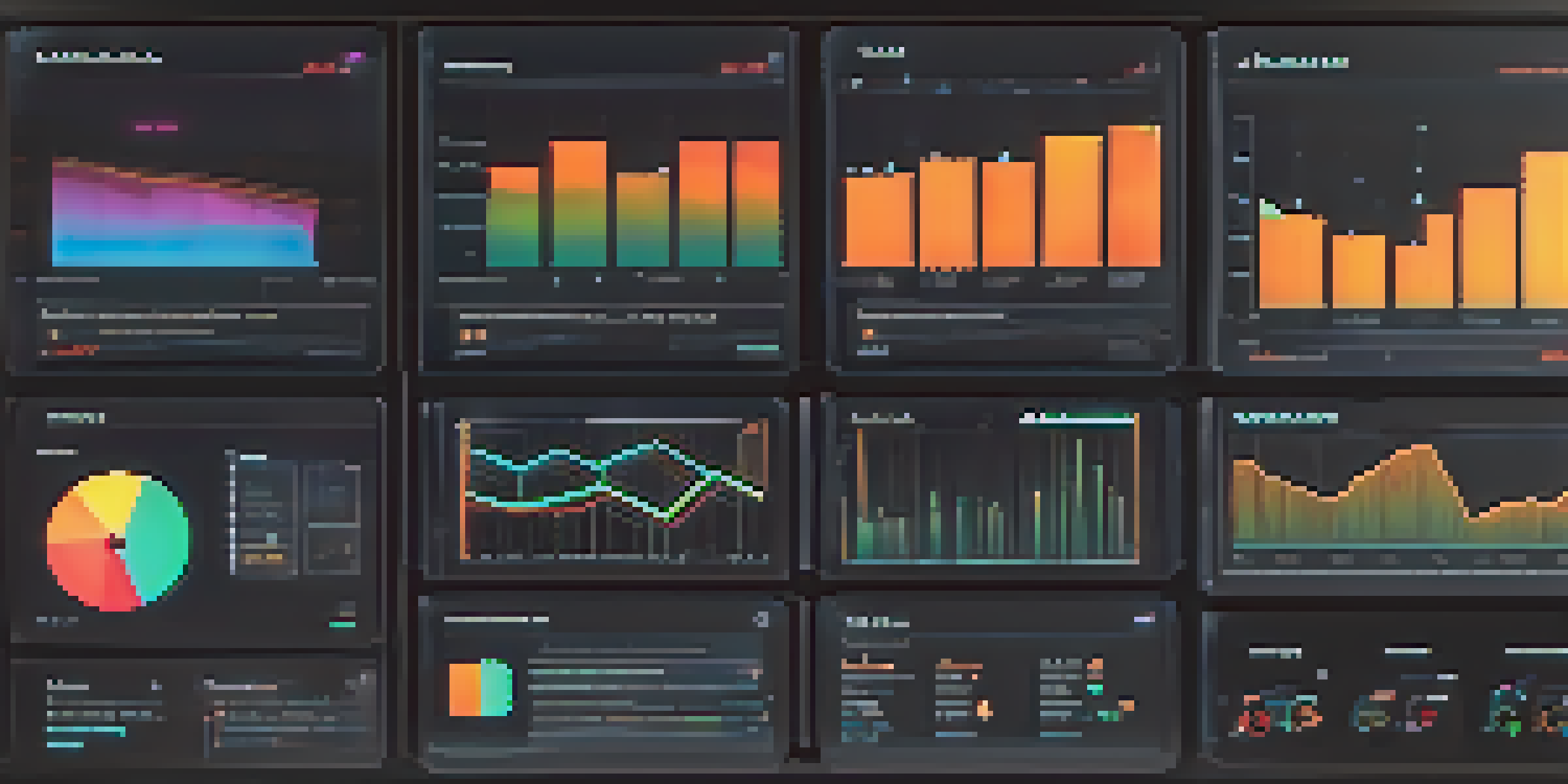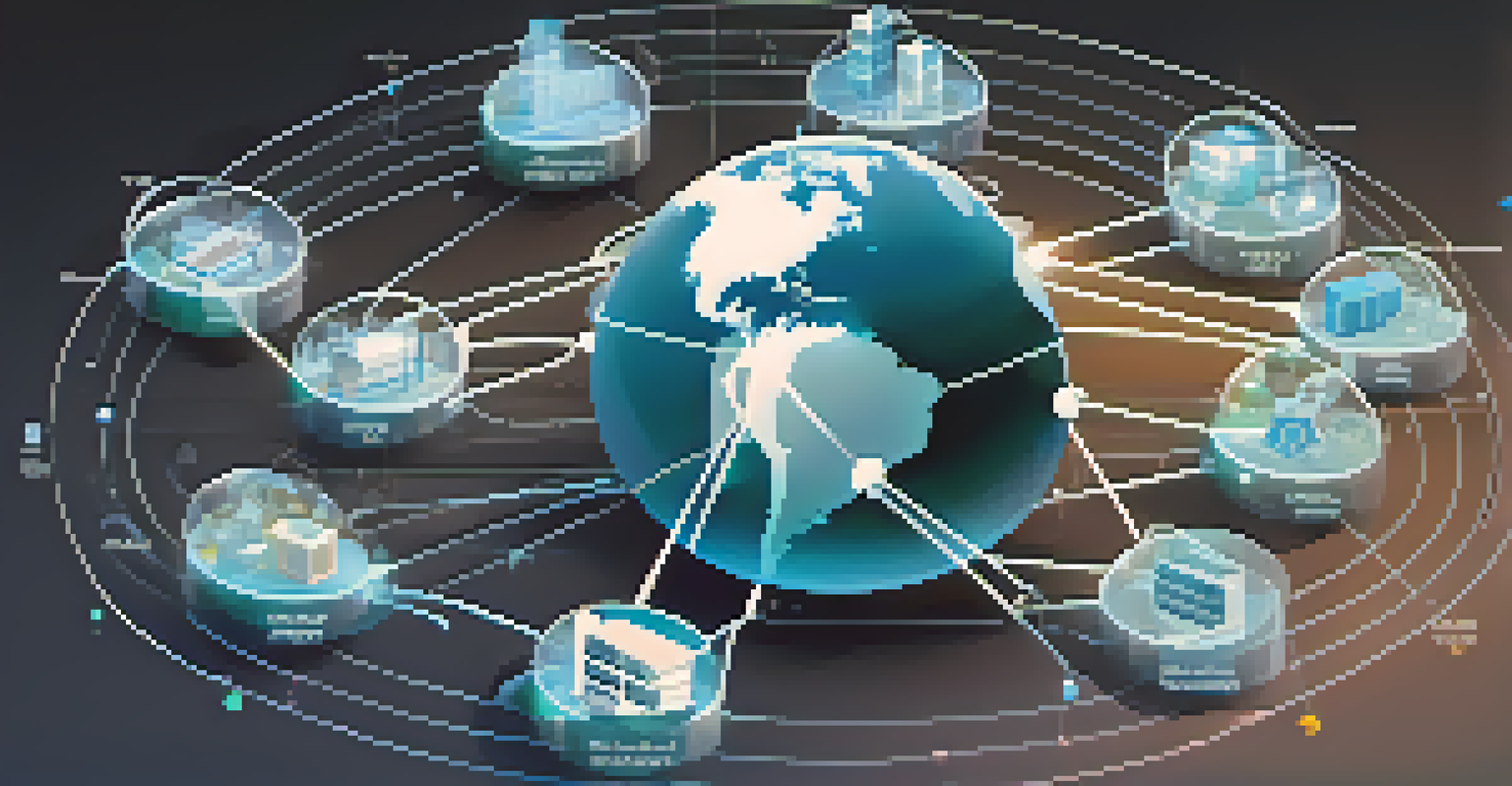Use Cases of Decentralized Oracles in Various Industries

Understanding Decentralized Oracles: A Simple Overview
Decentralized oracles are technology bridges that connect blockchain networks to real-world data. They allow smart contracts to access external information, which is crucial for their functionality. Think of them as translators, converting complex data from the outside world into a language that blockchains can understand.
Blockchain technology is the key to a more decentralized future, enabling trust and transparency across various sectors.
Unlike traditional oracles that rely on a single source, decentralized oracles aggregate data from multiple sources, enhancing accuracy and security. This redundancy helps prevent manipulation, making them a reliable choice for various applications. Imagine a weather app that uses multiple sources to give you a more accurate forecast.
By enabling smart contracts to interact with real-world events, decentralized oracles open up new possibilities for industries ranging from finance to supply chain management. They represent a leap in how we can leverage blockchain technology, adding an essential layer of functionality.
Decentralized Oracles in Finance: Revolutionizing Transactions
In the finance sector, decentralized oracles are transforming how transactions and contracts are executed. They enable real-time data feeds for price fluctuations, which can trigger smart contracts automatically, ensuring timely actions. Imagine an insurance policy that pays out automatically when a flight is delayed, relying on accurate data from multiple sources.

These oracles also enhance decentralized finance (DeFi) platforms by providing reliable data for lending, borrowing, and trading operations. This reliability helps minimize risks associated with price manipulation, creating a safer environment for users. Picture a trading platform that adjusts its rates dynamically based on real-time market data.
Decentralized Oracles Enhance Data Access
These oracles connect blockchain networks to real-world data, enabling smart contracts to function effectively.
As more financial institutions adopt decentralized oracles, we can expect increased transparency and efficiency in transactions. This innovation could lead to reduced costs and improved trust among users, paving the way for a more accessible financial system.
Enhancing Supply Chain Management with Decentralized Oracles
The supply chain industry is leveraging decentralized oracles to improve transparency and traceability. By connecting various stakeholders with real-time data, these oracles enable better decision-making and accountability along the supply chain. Imagine tracking a package from production to delivery, with all data verified by decentralized sources.
The future of finance is decentralized, built on trustless systems that empower individuals and reduce the need for intermediaries.
These oracles can provide information about product origin, quality, and shipment status, which is vital for industries like food and pharmaceuticals. This ensures that consumers receive genuine products, while companies can quickly address any issues that arise. Think of it as having a digital passport for each product that verifies its authenticity.
As decentralized oracles gain traction in supply chain management, we can expect a reduction in fraud and inefficiencies. This shift not only benefits businesses but also builds consumer trust, as people increasingly demand transparency in what they purchase.
Decentralized Oracles in Insurance: Smart Policies in Action
Decentralized oracles are reshaping the insurance industry by automating claims processes and enhancing policy management. By feeding real-time data into smart contracts, these oracles can trigger automatic payouts based on predefined conditions. Picture a scenario where a homeowner receives an instant payout if their property is damaged by a natural disaster, without the need for lengthy claims processes.
This automation reduces administrative costs and accelerates transactions, providing a better experience for policyholders. Additionally, using decentralized data sources minimizes the risk of fraud, making the entire system more reliable. Think of it as having a digital assistant that ensures claims are handled swiftly and accurately.
Transforming Industries with Automation
Decentralized oracles streamline processes in sectors like finance and insurance by automating actions based on real-time data.
As more insurance companies adopt decentralized oracles, we can expect a shift towards more dynamic and user-friendly policies. This evolution could lead to innovative coverage options that better match the needs of modern consumers.
Healthcare Innovations Powered by Decentralized Oracles
In the healthcare sector, decentralized oracles are facilitating better data sharing and patient care. They can connect health records with real-time patient data, ensuring that healthcare providers have the most current information. Imagine a doctor receiving instant alerts about a patient's vital signs, allowing for timely interventions.
These oracles can also enhance clinical trials by providing accurate data from multiple sources, ensuring that results are verifiable and trustworthy. This could lead to faster drug approvals and better patient outcomes. Think of it as having a collaborative network of data that all parties can access seamlessly.
As decentralized oracles become more integrated into healthcare systems, we can expect improved patient engagement and better health outcomes. This technology not only empowers patients but also enhances the overall efficiency of healthcare delivery.
Decentralized Oracles in Gaming: Creating Fair Play Environments
The gaming industry is exploring decentralized oracles to create fairer and more transparent gaming environments. By using these oracles to provide random number generation and game outcomes, developers can ensure that players receive fair treatment. Imagine a lottery game where the results are verified by multiple sources, eliminating concerns about rigging.
These oracles can also facilitate in-game economies by providing real-time data for asset trading and rewards distribution. This creates a more engaging experience for players, as they can trust the integrity of the game. Think of it as having a referee that guarantees fair play in every match.
Boosting Transparency Across Sectors
By providing verified information, decentralized oracles improve accountability and trust in industries such as supply chain management and real estate.
As decentralized oracles continue to evolve in the gaming space, we can expect more innovative game designs and business models. This will not only enhance player trust but also contribute to a more vibrant gaming community.
Decentralized Oracles in Real Estate: Streamlining Transactions
In real estate, decentralized oracles are streamlining property transactions and ensuring greater transparency. By providing verified data on property values, ownership records, and market trends, they simplify the buying and selling process. Imagine a scenario where buyers can instantly access all relevant property data, reducing the time and effort involved in transactions.
These oracles can also help mitigate risks by providing real-time data on property conditions and market fluctuations. This empowers both buyers and sellers to make informed decisions, leading to more successful transactions. Think of it as having a trusted advisor who provides you with all the insights you need before making a big investment.

As decentralized oracles gain traction in the real estate sector, we can expect a shift towards more efficient and transparent transactions. This evolution could ultimately make property ownership more accessible and appealing to a broader audience.
The Future of Decentralized Oracles: Emerging Trends and Possibilities
As we look to the future, decentralized oracles are poised to play an increasingly important role across various industries. Emerging trends suggest that their integration will expand, leading to even more innovative applications. Imagine a world where every industry can harness the power of real-time data through decentralized systems, creating a more interconnected economy.
With advancements in technology and growing acceptance of blockchain solutions, we can expect to see new use cases that we haven't even imagined yet. This could range from enhanced voting systems to improved supply chain logistics, all benefiting from the reliability of decentralized oracles. Think of it as laying the groundwork for a more efficient and trustworthy global ecosystem.
Ultimately, the future of decentralized oracles looks promising, with the potential to redefine how industries operate. As businesses continue to explore this technology, we can anticipate a wave of innovation that could significantly improve efficiency and transparency across the board.